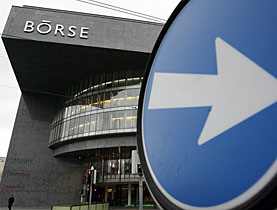Hedge funds value “culture” over tax breaks

Switzerland’s hopes of luring hedge funds over from London depend more on creating the right business culture than tax incentives, according to an industry expert.
Talk of fund managers running away from higher British taxes has not yet amounted to much so far. And proposed new European Union financial rules may yet disadvantage Swiss-based operations.
Property specialists, relocation firms and, occasionally, cantonal finance chiefs have been busy fuelling speculation that London hedge fund managers are not happy with the hiking of the top British tax rate from 40 per cent to 50 per cent next year.
Two years ago Switzerland announced its ambition to lure more specialists in the alternative investment arena to the Swiss financial marketplace. But only a handful of funds, including BlueCrest Capital and Brevan Howard Asset Management, have confirmed they are looking into the possibility.
Marc Gabelli believes that some funds may follow the example set this year by his firm, Gabelli & Partners, by setting up additional offices in Switzerland to complement their London and New York operations. The problem with moving lock stock and barrel is that the Swiss market is not fully developed enough, he said.
Clusters the key
“Switzerland does not have a cluster of single hedge fund professionals that they have in London or New York,” he told swissinfo.ch. “It is important to be able to mingle with your peers and have other competitors around. The whole culture in London is ahead of the curve.”
“Switzerland has a terrific pool of talent, but they are trained to service other people’s assets. There are, however, a lot of talented people – particularly in Zurich – who are thinking of becoming principals [trained in alternative investments].”
It will take time to build up such a cluster of highly skilled professionals in Switzerland, according to Gabelli. And he insisted that recent changes to Swiss regulations to tax hedge fund managers more favourably would not drive such a transformation.
“There is no trend in Switzerland to overtake the city of London any time soon,” he said. “Clusters matter no matter what you do – you need access to people and ideas. But they do not develop through tax and regulatory arbitrage.”
Hedge fund magnet?
Gabelli added that the fund’s Zurich office was opened as an additional location to tap into different ideas and to develop geographically right on the doorstep of important markets.
Around two thirds of the world’s single hedge funds, operations that manage one specific fund, are located in the United States, but London is home to an estimated 20 per cent of the global industry and is far and away the largest centre in Europe.
Despite the sophistication of its financial centre, Switzerland has only managed to attract about one per cent of single hedge funds. But it is home to around a third of global fund of hedge funds, operations that consolidate and repackage single hedge fund products.
There is also anecdotal evidence emerging from Britain that some single fund managers are waiting to see if an anticipated new government next year would reverse some of the new tax treatment.
Another reason to “wait and see” is the proposed EU regulation for the alternative investment industry. Hedge funds have been blamed in some quarters for exacerbating the financial crisis, and rules are being proposed to rein in the industry.
“Fortress Europe”
The latest proposals also include measures that would make it more difficult for non-EU based funds to operate within the Eurozone. It remains to be seen if these measures – seen as protectionist in some circles – make it into law.
But the Swiss Funds Association (SFA) is alarmed by proposed limits on the marketing and activities of non-EU funds and is lobbying Brussels hard for revisions to the measures.
In a letter written to the European Fund and Asset Management Association this month, the SFA warned that the latest proposals would “run counter to the interests of European professional investors.”
“We would like to warn that a ‘fortress Europe approach’ against third countries such as Switzerland might eventually harm the current unrestricted access of the European asset management industry to the Swiss market,” the letter added.
There was little, if any, enthusiasm for a general move to Switzerland at the Hedge Funds Zurich 2009 conference last week. However, the industry may be hold its cards close to its chest until the smoke clears from the financial crisis fall out.
Matthew Allen, swissinfo.ch
The European Union is currently looking into ways of controlling the hedge fund sector with new regulations. Some countries, notably France, appear to view alternative investments as a rogue sector that needs to be tamed.
In the aftermath of the financial crisis, a set of proposed new regulations proved so contentious that they have been revised twice. The latest draft is from European parliamentarian Jean-Paul Gauzes.
The problematic areas for Switzerland cover restrictions and marketing of funds not domiciled within the EU and the delegation of activities across EU borders.
Non-EU funds would have to prove that their country’s regulatory system was compatible with EU standards, including the exchange of tax information.
The SFA has complained that some of the language and terminology used in draft papers is vague and could lead to confusion.
However, with so many differences of opinion within the EU, it is likely to take several months before a final draft of new regulations can be produced for approval.

In compliance with the JTI standards
More: SWI swissinfo.ch certified by the Journalism Trust Initiative













You can find an overview of ongoing debates with our journalists here . Please join us!
If you want to start a conversation about a topic raised in this article or want to report factual errors, email us at english@swissinfo.ch.